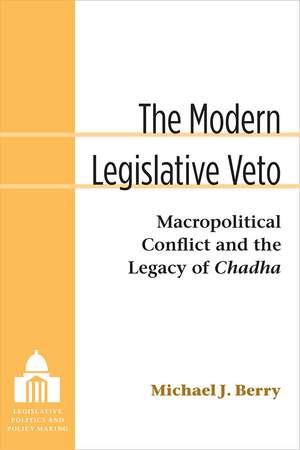The Modern Legislative Veto: Macropolitical Conflict and the Legacy of Chadha: Legislative Politics And Policy Making
Autor Michael J. Berryen Limba Engleză Hardback – 10 mai 2016
In The Modern Legislative Veto, Michael J. Berry uses a multimethod research design, incorporating quantitative and qualitative analyses, to examine the ways that Congress has used the legislative veto over the past 80 years. This parliamentary maneuver, which delegates power to the executive but grants the legislature a measure of control over the implementation of the law, raises troubling questions about the fundamental principle of separation of governmental powers.
Berry argues that, since the U.S. Supreme Court declared the legislative veto unconstitutional in Immigration and Naturalization Service (INS) v. Chadha (1983), Congress has strategically modified its use of the veto to give more power to appropriations committees. Using an original dataset of legislative veto enactments, Berry finds that Congress has actually increased its use of this oversight mechanism since Chadha, especially over defense and foreign policy issues. Democratic and Republican presidents alike have fought back by vetoing legislation containing legislative vetoes and by using signing statements with greater frequency to challenge the legislative veto’s constitutionality. A complementary analysis of state-level use of the legislative veto finds variation in oversight powers granted to state legislatures, but similar struggles between the legislature and the executive.
This ongoing battle over the legislative veto points to broader efforts by legislative and executive actors to control policy, efforts that continually negotiate how the democratic republic established by the Constitution actually operates in practice.
Berry argues that, since the U.S. Supreme Court declared the legislative veto unconstitutional in Immigration and Naturalization Service (INS) v. Chadha (1983), Congress has strategically modified its use of the veto to give more power to appropriations committees. Using an original dataset of legislative veto enactments, Berry finds that Congress has actually increased its use of this oversight mechanism since Chadha, especially over defense and foreign policy issues. Democratic and Republican presidents alike have fought back by vetoing legislation containing legislative vetoes and by using signing statements with greater frequency to challenge the legislative veto’s constitutionality. A complementary analysis of state-level use of the legislative veto finds variation in oversight powers granted to state legislatures, but similar struggles between the legislature and the executive.
This ongoing battle over the legislative veto points to broader efforts by legislative and executive actors to control policy, efforts that continually negotiate how the democratic republic established by the Constitution actually operates in practice.
Preț: 528.27 lei
Preț vechi: 664.71 lei
-21% Nou
Puncte Express: 792
Preț estimativ în valută:
101.11€ • 105.16$ • 84.73£
101.11€ • 105.16$ • 84.73£
Carte indisponibilă temporar
Doresc să fiu notificat când acest titlu va fi disponibil:
Se trimite...
Preluare comenzi: 021 569.72.76
Specificații
ISBN-13: 9780472119776
ISBN-10: 047211977X
Pagini: 352
Ilustrații: 25 tables, 14 figures
Dimensiuni: 152 x 229 x 32 mm
Greutate: 0.63 kg
Ediția:First Edition
Editura: UNIVERSITY OF MICHIGAN PRESS
Colecția University of Michigan Press
Seria Legislative Politics And Policy Making
ISBN-10: 047211977X
Pagini: 352
Ilustrații: 25 tables, 14 figures
Dimensiuni: 152 x 229 x 32 mm
Greutate: 0.63 kg
Ediția:First Edition
Editura: UNIVERSITY OF MICHIGAN PRESS
Colecția University of Michigan Press
Seria Legislative Politics And Policy Making
Notă biografică
Michael J. Berry is Associate Professor of Political Science at the University of Colorado, Denver.
Recenzii
“The Modern Legislative Veto is an exciting book, one that I have looked forward to for a long time. A discussion of the development of the legislative veto is timely and very important.”
—Mathew D. McCubbins, Duke University
—Mathew D. McCubbins, Duke University
“This book promises to be the definitive work on the legislative veto. It covers the legislative veto at both the federal and state levels, which makes it unique.”
—Erik J. Engstrom, University of California, Davis
—Erik J. Engstrom, University of California, Davis
Descriere
An important examination of the legislative veto and the ongoing battle between the executive and the legislature to control policy
















